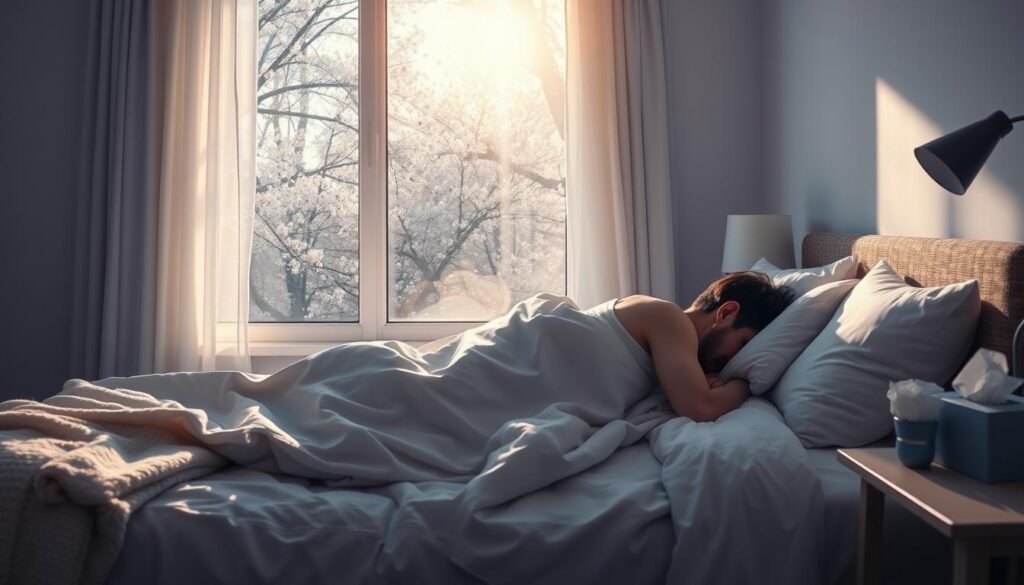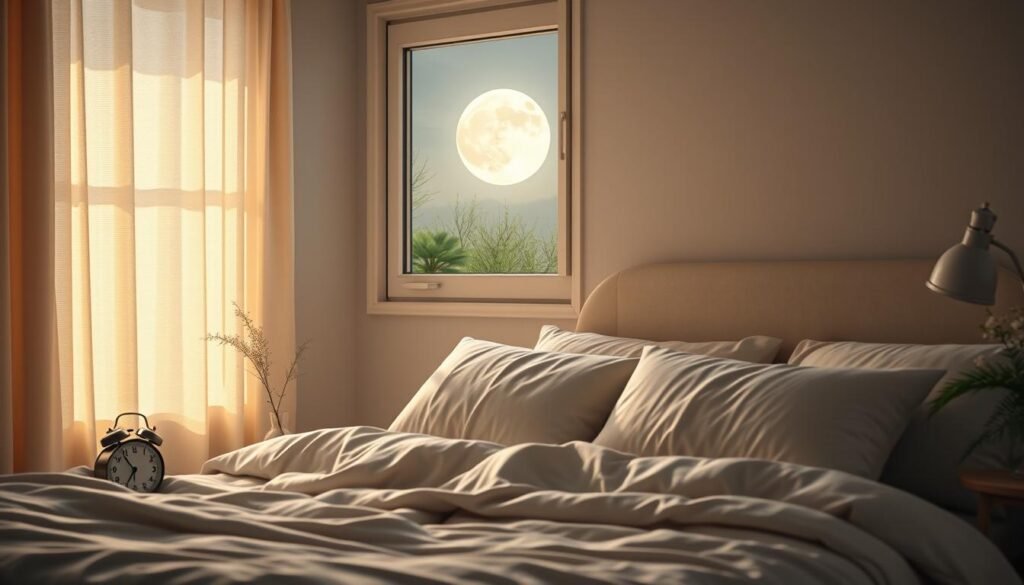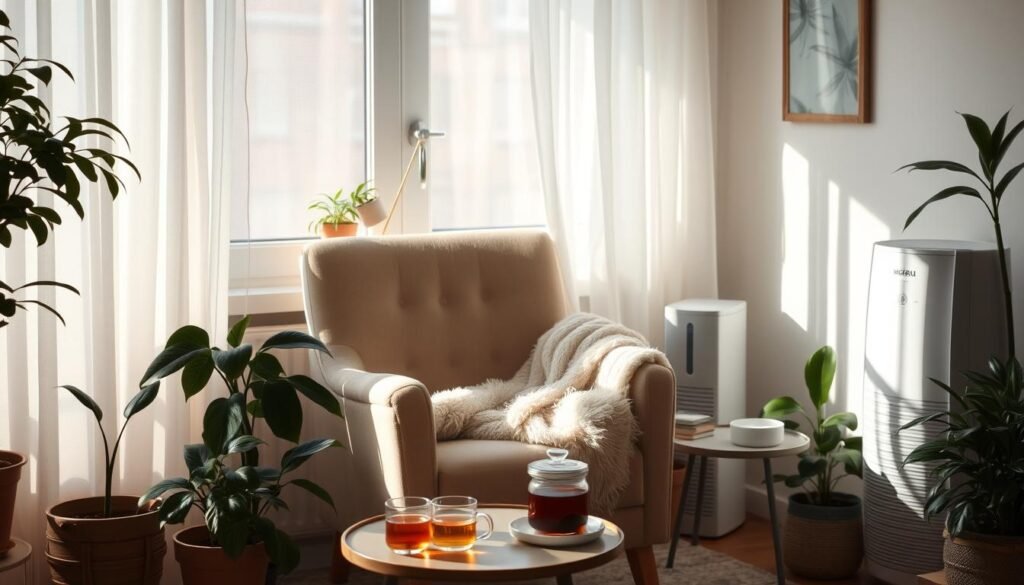Did you know over two-thirds of people with allergies feel tired all year? Many recognize sneezing and itchy eyes as allergy symptoms. Yet, they often overlook the tiredness that comes with allergic reactions. This piece looks into how both seasonal and chronic allergies make people feel drained. This exhaustion can greatly affect one’s daily life and happiness. By figuring out how allergies work and their effects, we can better handle the tiredness they bring.
Key Takeaways
- Fatigue is a common outcome of both seasonal and chronic allergies.
- Over two-thirds of allergy sufferers deal with year-round symptoms, impacting energy levels.
- Knowing what triggers your allergies, like pollen or dust mites, helps manage fatigue.
- Allergies can also lead to brain fog, making you feel even more tired.
- It’s important to identify and stay away from allergens to feel better and more energized.
Understanding Allergy Fatigue
Allergy fatigue makes you feel very tired, even if you get enough sleep. Your body fights allergens non-stop, which drains your energy. Knowing why allergy fatigue happens can help you deal with it better.
What is Allergy Fatigue?
Allergy fatigue happens when your body keeps fighting off allergies. Your immune system fights allergens by making antibodies and histamines. This constant battle can make you very tired. 81 million Americans had hay fever in 2021, showing it’s a big problem.
How Allergies Affect Energy Levels
Allergens like pollen and pet dander make your body respond in ways that can tire you out. These reactions, including chronic inflammation, make you more tired. Not sleeping well because of allergies makes you feel even more drained.
Making some life changes can help manage this tiredness. Eating right and staying hydrated are key. A dietitian can help find foods that don’t trigger allergies and suggest anti-inflammatory foods. For more on diet changes, check out this resource.
The Immune Response to Allergens
When your body meets allergens, it starts a defense mechanism called the immune response. This system sees safe substances as dangers. This causes various reactions in the body. Knowing about these reactions explains why allergies make you feel tired.
How Allergens Trigger Immune Responses
Your immune system makes special antibodies known as immunoglobulin E (IgE) when it finds allergens. These antibodies make your body release histamines. Histamines lead to swelling and discomfort. Because of this immune response, you might sneeze, get itchy eyes, or have a stuffy nose. As your body tries to fight off these allergens, you may start to feel tired.
Role of Histamines in Fatigue
Histamines are key in making you feel tired because of allergies. They cause swelling that can mess up your sleep and make you uncomfortable. This can lower your energy during the day. With your immune system always fighting allergens, you may feel very tired. This affects how well you live your day-to-day life.
Common Allergens and Their Effects on Energy
Many people feel tired because of allergens affecting their body. Knowing about common allergens helps people prevent tiredness. Let’s look at how seasonal allergies, indoor allergens, and food allergies affect energy levels.
Pollen and Seasonal Allergies
Seasonal allergies are often caused by pollen from trees, grasses, and weeds. They significantly lower energy levels. About 30% of people get symptoms like nasal congestion and headaches from allergies. These issues can mess with sleep and make you tired.
The immune system fights pollen by releasing histamines, which can make you sleepy. To reduce these effects, keep windows closed and use air filters when pollen levels are high.
Indoor Allergens: Dust Mites and Pet Dander
Indoor allergens like dust mites and pet dander can lead to chronic fatigue. Being around these allergens for too long can cause inflammation in the respiratory system. This inflammation can hurt your sleep quality, making you feel tired all day.
To fight off these allergens, wash your bedding often and use covers that keep allergens out. This can really help reduce your exposure to indoor allergens.
Mold and Food Allergies
Mold in damp places can cause severe allergic reactions and fatigue. Some foods can also trigger allergic reactions, causing bloating or tiredness. Allergy-related issues often lead to poor sleep because of inflammation in the body.
Talking to an allergist to find out what triggers your allergies can improve your life. For more about how allergies affect energy, check out this source.
How Seasonal and Chronic Allergies Cause Tiredness
Let’s dive into why seasonal and chronic allergies make us feel so tired. Allergies are a top cause of chronic illness in the U.S., affecting many people. Those with allergies often deal with swollen sinuses, clogged noses, and feeling really tired.
Connection Between Allergic Reactions and Fatigue
The body fights hard against allergens, which makes us feel drained. When we encounter allergens, our bodies react by swelling up and making more mucus. This can ruin our sleep. Even if we sleep enough, allergies can still make us feel wiped out during the day.
Things like dust mites and pet fur can make these problems worse. They make it hard to relax and sleep well. Taking antihistamines might help but can also make us sleepy. To combat this, using air purifiers, cleaning sheets in hot water, and taking showers before bed can help. This helps keep our sleeping area free of allergens, leading to better rest.

In summary, allergies can really impact our life by making us feel constantly tired. Talking to an allergist for a treatment plan, like immunotherapy, can help. This approach helps about 85% of people feel better. For more tips on dealing with tiredness from allergies, check out this resource.
Symptoms Associated with Allergy Fatigue
Allergy fatigue can lead to symptoms that impact both your body and mind. One common problem is nasal congestion. Another issue is brain fog. Knowing these symptoms helps us tackle the effects of allergies in our lives.
Nasal Congestion and Its Impact on Sleep
Nasal congestion can make it hard to sleep. It’s tough to breathe through your nose. This can wake you up often, leaving you tired the next day. Treating nasal congestion can help you sleep better and feel less tired.
Brain Fog: Understanding Cognitive Effects
Brain fog can also come from allergy fatigue. Allergies can make it hard for your nose to get enough oxygen. This might make you forgetful or mess with your focus. Understanding how nasal congestion and brain fog are linked shows why managing allergies is key.
The Importance of Sleep Quality
Getting good sleep is key for health and wellness. People with allergies often find it tough to sleep well. Allergies can interrupt sleep in many ways. This makes it important to improve sleep habits.
How Allergies Disrupt Sleep Patterns
Allergies can make it hard to sleep by blocking your nose. This might cause snoring or sleep apnea. These issues can cut down on restful sleep and make you tired during the day. About 40% of Americans suffer from allergic rhinitis. Those with allergies are more likely to have insomnia. There’s a clear link between how bad allergies are and sleep problems.
Strategies to Improve Sleep Hygiene
Here are ways to sleep better and deal with allergies:
- Keep your sleeping area free from allergens with air purifiers and closed windows.
- Avoid heavy drapes and upholstered furniture that can hold allergens.
- Showering before bed helps remove pollen from your skin and hair.
- Switching allergy medicine to nighttime can lessen symptoms while you sleep.
- Talk to a doctor for advice tailored to your allergies.
- Not sleeping with pets can lower contact with dander and hair.

Antihistamines and Their Side Effects
Antihistamines are a top choice for treating allergies. Yet, they can make you feel sleepy and lower your energy. Knowing about the types of allergy meds and their side effects aids in choosing wisely.
Common Antihistamines and Drowsiness
First-generation antihistamines, like diphenhydramine (Benadryl), often cause sleepiness. This makes them bad for driving or needing concentration. But, second-generation antihistamines, like cetirizine (Zyrtec) and loratadine (Claritin), are better at easing allergy symptoms with less drowsiness.
The side effects from antihistamines can be:
- Drowsiness
- Dry mouth
- Constipation
- Dizziness
- Nervousness
Some people may react more to these side effects. If you have issues like diabetes, heart disease, or glaucoma, talk to a doctor before starting on allergy meds.
Choosing the Right Medication for Allergies
You should think about your daily life and how you handle sleepiness when choosing a medication. If you get tired easily, non-sedating antihistamines like desloratadine (Clarinex) or fexofenadine (Allegra) might be better. They manage allergies well without making you sleepy.
See how different antihistamines compare:
| Antihistamine | Generation | Drowsiness Risk |
|---|---|---|
| Diphenhydramine (Benadryl) | First-Generation | High |
| Cetirizine (Zyrtec) | Second-Generation | Moderate |
| Loratadine (Claritin) | Second-Generation | Low |
| Fexofenadine (Allegra) | Second-Generation | Low |
| Desloratadine (Clarinex) | Second-Generation | Low |
Always check for drug interactions, even with alcohol, before starting antihistamines. Be aware of drowsiness risks when doing tasks that need your full focus.
Managing Allergy Fatigue
People with allergy fatigue see improvements by changing their lifestyle. Making small yet steady changes can greatly improve life quality. These methods focus on daily habits and diet, aiming to lessen fatigue and boost well-being.
Effective Lifestyle Changes
Exercising regularly boosts your immune system and eases allergy signs. Activities like walking or yoga can lift your energy and mood. Keeping hydrated is also key in fighting allergy tiredness. It helps thin mucus and keep your body running well.
A good sleep routine is important for recovery and health.
Diet and Nutrition Adjustments
Eating right is crucial for battling allergy issues. A diet with lots of fruits, veggies, and omega-3s supports your immune system and combats allergy tiredness. Foods rich in antioxidants can help fight inflammation too.
Avoiding processed foods is a good move. They can make allergy symptoms worse. Making diet changes and keeping up with these lifestyle tips can boost your energy and health. Adjusting one’s diet is beneficial.

Consulting with Healthcare Professionals
Getting help for allergy-related tiredness is key. Doctors are vital in finding out which allergies you have. They start with detailed exams and tests to find out what you’re allergic to.
The Role of Allergy Testing
Allergy tests help doctors find what causes your reactions. They use skin and blood tests to identify allergens like pollen and pet fur. Knowing your triggers helps you avoid them and manage your allergies better.
Potential Treatment Options: Immunotherapy
Immunotherapy is a leading treatment for severe allergies. It slowly makes your body less sensitive to allergens, easing symptoms like tiredness. Doctors customize this treatment from test results, making it specific to your needs. There are different types, including shots and tablets, helping many people.
Conclusion
Knowing how seasonal and chronic allergies affect tiredness is key. Allergies start reactions in our bodies, making us feel tired. This happens because our immune system fights hard against allergens.
The effort to fight allergens can make us tired for hours or even days. It’s important to understand this.
Allergy attacks release histamines. Histamines can make us sneeze and cough, which uses up our energy. Allergens also cause inflammation. This can drain our energy even more. So, it’s crucial to know what triggers your allergies.
With this knowledge, we can better manage our energy levels.
Making informed choices about how we live and seeking medical advice can help a lot. For more on managing seasonal allergies, check out these guidelines. By using these strategies, we can control our allergies better.
This helps us live healthier lives. And it reduces the tiredness that allergies bring.